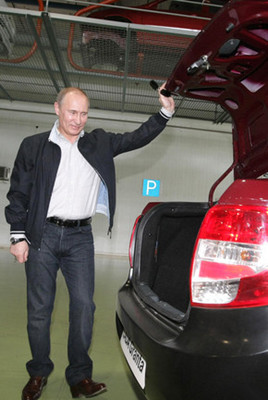俄羅斯商業
From bad to worse
每況愈下
Domestic and foreign firms wonder how serious things might get
國內外的企業都想知道境況將會變得多嚴峻
BEFORE the current standoff between the Kremlin and the West over Ukraine, it was already clear that Russia's economic model, of strong energy exports fuelling domestic consumption, was running out of steam. In 2007, on the eve of the global financial crisis, Russia's economy grew by 8.5%. Last year growth was a meagre 1.3%.
如今,克里姆林宮正與西方就烏克蘭問題僵持不下,而遠在這場風波之前,人們就可以清楚地看到俄羅斯這種以大量出口資源帶動國內消費的經濟模式已是日薄西山。遙想在全球經濟危機七夕的2007年,俄羅斯的經濟增長水平高達8.5%,而去年這一數字卻只有3%。

Still, the country's population of 144m, its entry into the World Trade Organisation, its consumers' aspiration to a Western lifestyle and its status as the “R” in the BRICs have persuaded multinationals to keep investing in plants in Russia, and foreign investors to keep providing capital to Russian firms. The attitude until recently, says Alexis Rodzianko of the American Chamber of Commerce in Moscow, was that “Russia's economy may be slowing, but my own prospects are pretty good.”
然而,俄羅斯是一個擁有1.44億人口的金磚大國,不久前還加入了世貿組織,其國民也很向往西方的消費方式。這一切都促使跨國公司馬不停蹄地在俄投資建廠,國外投資者也不斷向其國內的公司輸送資金。莫斯科美國商會會長羅德辛柯(Alexis Rodzianko)不久前表達了他的看法:“俄羅斯的經濟可能是在放慢腳步,但我本人對其還是抱有很大的期望。”
Now the outlook for businesses there is looking gloomier. With pro-Russian separatists seizing government buildings in eastern Ukraine, amid talk of a full-scale invasion, firms of all kinds fear a tightening of American-led sanctions, a cut-off of foreign lending and investment, and a further fall in consumers' confidence.
現在,人們對俄羅斯企業的發展前景感到更悲觀了。烏克蘭東部的親俄分離主義者占領了多處政府機關建筑,關于“全面入侵”烏克蘭問題的會談也正在進行中,俄羅斯國內所有的公司都擔心以美國為首的國家會對加大對俄制裁力度,削減對俄的貸款與投資,致使國內的消費者進一步失去信心。
The most immediate concern, especially for Western firms doing business in and with Russia, is the curbs the United States and the European Union have imposed on dealings with certain individuals. Even the somewhat stronger American sanctions imposed so far are, on paper, “pretty limited”, says Alexander Kliment of Eurasia Group, a risk-analysis firm. But they have created a “scare factor” that is magnifying their effect. For example, shares in Novatek, a gas producer, fell sharply when the restrictions were announced, on fears it might struggle to do deals with foreign partners or raise capital abroad because Gennady Timchenko, a friend of Vladimir Putin's named on the American sanctions list, owns 23% of the company and sits on its board. If Igor Sechin, the boss of Rosneft, another energy firm, is sanctioned, the effect may be similar.
美國和歐盟已經對與俄羅斯特定人物的交易實施了限制,這是駐俄的和與俄有業務往來的西方公司所要面對的最迫切的難題。風險評估公司歐亞集團(Eurasia Group)的風險評估員克利門特(Alexander Kliment)稱,僅從字面上看,盡管是相對更嚴厲的美國方面的制裁作用似乎“十分有限”,但是它們已經催生出了一些“恐懼因素”,從而放大了其效力。比方說,普京的朋友,擁有天然氣生產商諾瓦泰克公司(Novatek)23%股份的季姆琴科(Gennady Timchenko)被列入了美國的制裁名單;制裁令甫一發出,Novatek的股價便急劇下降,因為人們擔心制裁會成為其進行國際貿易與融資的絆腳石。如果另一家的能源企業俄羅斯石油公司(Rosneft)的老板也被制裁,其公司的股價也會有下降之虞。
Foreign firms fret that sanctions could also create openings for competitors. American firms worry that the EU's softer curbs may give its companies more flexibility. The boss of Siemens, a German engineering giant, met Mr Putin in Moscow last month. Americans and Europeans alike worry about losing out to Asian rivals. Moscow business circles are full of rumours of Chinese executives trying to peel off contracts by urging Russian companies not to depend on Western ones, given the possibility of further trading restrictions.
外國企業同樣擔心制裁會給它們的競爭對有可乘之機。美國的企業擔心歐盟方面較寬松的制裁會歐洲的企業有空子可鉆。上個月,德國電氣巨頭西門子(Siemens)的老板在去莫斯科拜訪了普京。歐美的企業共同的顧慮則是它們會在競爭中輸給亞洲的對手。莫斯科的商業圈充斥著這樣的謠言,說中國企業為了獲得與俄羅斯公司的合同,正敦促俄羅斯公司不要太依賴西方公司,因為貿易限制還可能會繼續增加。
Russian firms and politicians, in turn, are casting around Asia and elsewhere for new customers to replace those they fear losing from the West. Russia's deputy prime minister, Arkady Dvorkovich, said this week that the government hoped to finalise soon a long-promised deal for Gazprom to sell gas to China. Rosneft is seeking to treble its exports of oil to China. Sukhoi, a state-owned aircraft-maker, has just struck a deal to sell a fleet of small passenger jets to a Chinese airline, hoping this will offset any loss of orders from Western carriers. But its plane, the Superjet, is chock full of key parts from American and European suppliers, and thus its production is vulnerable to any tightening of sanctions.
而另一方面,因害怕將來會失去西方的客戶俄羅斯的公司也在亞洲和其他地區尋找新客戶。本周,俄羅斯副總理達瓦科維奇(Arkady Dvorkovich)稱,俄政府希望可以盡快為俄羅斯國家天然氣公司(Gazprom)敲定一筆向中國出售天然氣的長期合同。俄羅斯石油公司(Rosneft)也正在設法使其出口到中國的石油銷量犯上三番。俄羅斯國營飛機制造上蘇霍伊(Sukhoi)不久前也與中國某航空公司達成了一筆銷售小型客機的協議,期望以此抵消其因與西方航空公司之間訂單減少造成的損失。但是蘇霍伊生產的噴氣式飛機的重要零部件大部分都來自歐美,所以一旦制裁收緊,其產能將受到極大影響。
For domestic firms, a bigger worry than the sanctions imposed so far is the risk of losing access to foreign loans, and what that will mean for investment, productivity and growth, says Elena Anankina of Standard & Poor's, a ratings agency. Western lenders are likely to honour existing loan deals. But they may be reluctant to provide fresh financing. Rusal, an indebted aluminium producer, is among the Russian firms most exposed to this. Some state banks, such as Sberbank and VTB, have indicated they are ready to fill the gap left by Western lenders. But Ms Anankina wonders how long they will be able to do so. Indeed, some Russian banks themselves depend on Western loans. With capital flight hitting 60-70 billion in the first quarter of this year alone, investment in domestic production—what the spluttering economy needs most of all—will be even harder to come by.
標準普爾(Standard & Poor's)分析師Elena Anankina稱,對于俄羅斯的本土企業,比起目前的這些禁令,更令它們是未來失去國外融資渠道的風險。西方的貸方可能會完成目前的貸款協議,但是不會愿意提供新一輪的貸款。在俄羅斯眾多可能受此問題影響公司中,負債累累的俄羅斯鋁業公司(Rusal)可謂首當其沖。俄羅斯的一些國家銀行——如Sberbank和VTB——表示,它們已經準備好去填補西方貸款機構離去后留下的空白。但是Anankina懷疑這些銀行不能堅持很長時間。事實上,一些俄羅斯銀行自身還需要依靠外國資本。僅本年第一季度,俄羅斯的資本流出量就高達6-7千萬美元;現在俄羅斯的經濟處于困難時期,國內的生產比以往任何時候都急需投資,這一變故將使該需求更難得到滿足。
The fallout from Russia's annexation of Crimea and further stoking of unrest in eastern Ukraine has put downward pressure on an already weakening rouble. On its face, a cheaper currency should be a boon to domestic producers. Visiting Moscow this month, Carlos Ghosn, the boss of Renault-Nissan, a global carmaker which is buying control of AvtoVAZ, the maker of Lada cars, argued that the weak currency will be “an advantage for local brands”.
由于俄羅斯吞并克里米亞,還不斷加劇烏克蘭東部的緊張局勢,給本已日漸疲軟的盧布又增加了下行的壓力。從表面上看,貶值的貨幣對于國內的生產商來說是有益的。雷諾日產(Renault-Nissan)的老板戈恩(Carlos Ghosn)在本月出訪俄羅斯稱疲軟的貨幣會是“本土品牌的優勢”。目前雷諾日產正試圖控股奧托瓦茲(Avtovaz),后者是拉達汽車的生產者。
But thinking that a “weak rouble is the way forward” is the “wrong paradigm,” argues Yaroslav Lissovolik of Deutsche Bank. Many Russian manufacturers, like Sukhoi, depend on imports for inputs and equipment. And in any case, many are running near full capacity and will be unable to grab market share from foreign rivals without money to invest in increasing output.
但是,德意志銀行的利梭沃里克(Yaroslav Lissovolik)說“貨幣貶值是進步”的想法是“典型的錯誤”。他指出,俄羅斯的許多生產商同蘇霍伊一樣,需要依靠國外的資金和設備。所以,如果沒有投資來提高產出,即使俄國企業開足馬力進行生產,也很難從外國競爭對手那里搶占市場份額。
This confluence of economic bad news will hit a few industries first and hardest: consumer goods, construction, property and banking. Demand for the roughly half of Russian steel that goes to building projects at home will drop. Car sales, dependent on the availability of bank loans, will probably fall. Already a softening market has led Ford to consider cutting production at its joint venture with Sollers, a Russian firm. Even a continuation of the current stand-off between the Kremlin and the West would be bad enough for business. But things may well get far worse.
這些接連發生的經濟問題會首先打擊也是打擊得最狠的使這些行業:日常消費品,房地廠和銀行。俄羅斯將近一半的鋼材輸送給國內的建筑業,而這一需求將會下降。需要銀行貸款來之稱的汽車銷售數量也可能下跌。俄羅斯本已縮水的汽車市場讓福特的削減了其在俄的合資公司索萊爾(Sollers)的產量。現在俄與西方持續對峙的局勢對俄羅斯的商業造的成負面影響已經夠嚴重的了,但是情況可能還會變得更糟糕。












